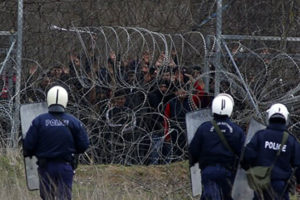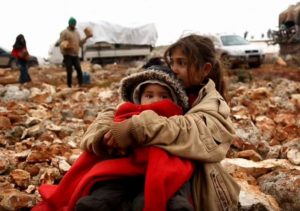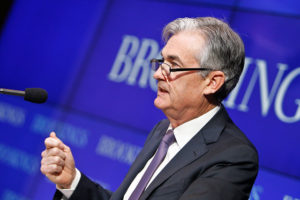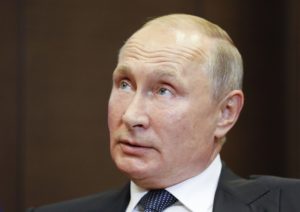U.S., NATO Must Seek Diplomatic Resolution to Ukraine Crisis
Nothing Washington or NATO can do for Ukraine will give it anything approaching an independent ability to expel Russian-reinforced Ukrainian separatists and expel the Russian invaders who support them.

Russian President Vladimir Putin. Photo by Slavko Sereda / Shutterstock.com
Last Friday six major European newspapers, including The Guardian in Britain, Le Monde in France, Suddeutsche Zeitung, and others in Spain, Italy and Poland published six-page “Europa” special sections devoted to arguing that Europe is surrounded by military threats posed by Muslim jihadists and by the Russia of President Vladimir Putin.
The emphasis was on the latter, the danger to Europe of Russian aggression.
Publication coincided with the annual Munich Security Conference. The newspaper supplement included a special interview with U.S. Vice President Joseph Biden, who is all for rearming Ukraine with “defensive” weapons to match Russia’s heavy arms and defeat Putin’s supposed ambition to change the frontiers of Europe’s states. The pro-arming Ukraine camp would seem to have wealthy backers.
Zbigniew Brzezinski was also interviewed. He found troublesome parallels between the situation of Europe today, especially the Baltic states, and in 1938-39, but he also cautioned both Russia and the NATO countries that what is going on now risks war between the United States and Russia. He warned the latter that Ukraine’s turn to the West is an act of self-determination and is not a threat to Russia so long as both sides understand the lesson taught by Finland’s Cold War experience of maintaining a well-armed neutral position between the two sides.
“Finlandization” is not the proposal made by Russia in a letter sent by Putin to the other expected participants in the meeting set to be held in Minsk today (February 11), Chancellor Angela Merkel of Germany, President Francois Holland of France and President Petro Poroshenko of Ukraine. Russia, according to the letter, will readily accept “the territorial integrity” of Ukraine provided that a similar recognition is granted by Ukraine (and the West, presumably) to an independent pro-Russian political region, as voted by the Russophone residents of Donbass, on the Russian-Ukrainian border last November. There must be an agreed buffer zone defining this self-governing region. This would resemble the status of the Russian-speaking and Russian-dominated territories of Transnistria on Moldova’s border and the autonomous territory of Abkhazia which Georgia foolishly and unsuccessfully tried to seize in 2008, but lost to Russia’s control. Crimea’s possession by Russia would be permanent.
What Putin is saying to the NATO and the EU powers is: “You tried last February, through your coup d’etat in Kiev, to annex Ukraine to the European Union and NATO, violating the guarantees the U.S. solemnly gave us that NATO would never be advanced to our national frontiers. We and our Russian-speaking friends in these countries have thwarted you, and we reclaim them as a part of Russia itself — in the Crimean case — or as part of a Russian-speaking international community of enclaves historically connected to us and loyal to us. What are you going to do about this? Go to war?”
Except for Poland and the Baltic states, who are special cases because of their location and histories, the European NATO governments apparently all say “no.” That certainly is what Merkel, head of the leading EU government, and Hollande of France (which, with Britain, is militarily the most powerful European state) have both said. Britain has been discreetly silent but pro-American.
Where does the United States itself stand? Sen. John McCain is for military support for Kiev, as are a large number of Republican politicians (most of whom have never personally risked service in a war — the “Chicken Hawks”). The domino theory has made its reappearance. There has been relatively little realistic discussion in Washington of what arming and militarily backing Kiev against Moscow could really mean.
If there is no military support from NATO, would Ukraine go on fighting? I would be greatly impressed if it did.
After a grave conversation with Merkel at the White House on Monday, President Obama said the American sanctions on Russia would remain but that “the prospect for a military solution to this problem has always been low,” implicitly acknowledging the danger posed by the clash between Russia and the U.S. As for supplying Ukraine with heavy (“defensive”) weapons to use against Russian armor, he said he has not yet decided.
The obvious problem in doing so is that the Ukrainian Army thus far has shown itself less than impressive in action. Its World War II experience was as part of the Soviet Army, and it is generally acknowledged by those close to the scene as permeated at all levels by Russian sympathizers. Sending it new weapons will not solve this.
Nothing Washington or NATO can do for Ukraine will give it anything approaching an independent ability to expel Russian-reinforced Ukrainian separatists and expel the Russian invaders who support them.
To try would invite foreign intervention on both sides. The U.S. has a record of reckless interventions. The situation also invites escalation. Russia has warned of nuclear war. The U.S. has a military tradition of resort to overwhelming force. It should be remembered that the Cuban Missile Crisis saw both sides going on nuclear alert. It was solved by a mixture of arms and diplomacy. What stopped it was the American threat to intercept Russian ships carrying missiles to Cuba, and secret talks that produced an eventual withdrawal of U.S. missiles in Turkey in exchange for Russians withdrawing theirs in Cuba. The crisis in Ukraine demands a diplomatic solution by the officials who are meeting today in Minsk. If they fail, the situation will be decided in Washington, and we will be in real danger.
Visit William Pfaff’s website for more on his latest book, “The Irony of Manifest Destiny: The Tragedy of America’s Foreign Policy” (Walker & Co., $25), at www.williampfaff.com.
© 2015 Tribune Media Services, Inc.
Independent journalism is under threat and overshadowed by heavily funded mainstream media.
You can help level the playing field. Become a member.
Your tax-deductible contribution keeps us digging beneath the headlines to give you thought-provoking, investigative reporting and analysis that unearths what's really happening- without compromise.
Give today to support our courageous, independent journalists.






You need to be a supporter to comment.
There are currently no responses to this article.
Be the first to respond.